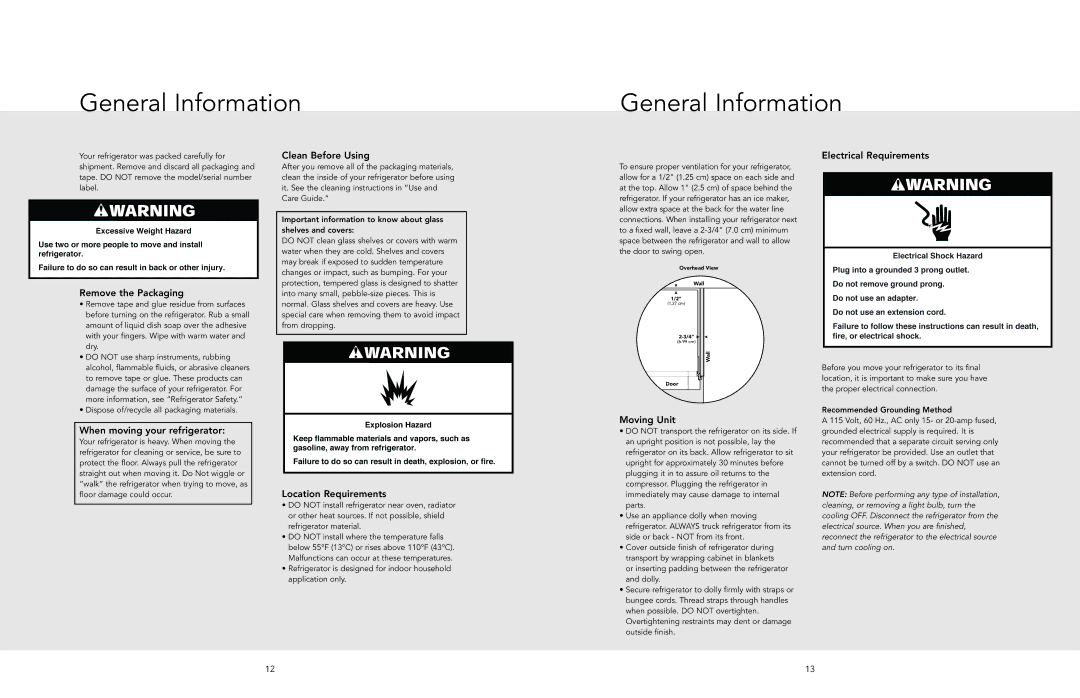
General Information
General Information
Your refrigerator was packed carefully for
Clean Before Using
Electrical Requirements
shipment. Remove and discard all packaging and tape. DO NOT remove the model/serial number label.
Remove the Packaging
•Remove tape and glue residue from surfaces before turning on the refrigerator. Rub a small amount of liquid dish soap over the adhesive with your fingers. Wipe with warm water and dry.
•DO NOT use sharp instruments, rubbing alcohol, flammable fluids, or abrasive cleaners to remove tape or glue. These products can damage the surface of your refrigerator. For more information, see “Refrigerator Safety.”
•Dispose of/recycle all packaging materials.
When moving your refrigerator:
Your refrigerator is heavy. When moving the refrigerator for cleaning or service, be sure to protect the floor. Always pull the refrigerator straight out when moving it. Do Not wiggle or “walk” the refrigerator when trying to move, as floor damage could occur.
After you remove all of the packaging materials, clean the inside of your refrigerator before using it. See the cleaning instructions in “Use and Care Guide.”
Important information to know about glass shelves and covers:
DO NOT clean glass shelves or covers with warm water when they are cold. Shelves and covers may break if exposed to sudden temperature changes or impact, such as bumping. For your protection, tempered glass is designed to shatter into many small,
Location Requirements
•DO NOT install refrigerator near oven, radiator or other heat sources. If not possible, shield refrigerator material.
•DO NOT install where the temperature falls below 55°F (13°C) or rises above 110°F (43°C). Malfunctions can occur at these temperatures.
•Refrigerator is designed for indoor household application only.
To ensure proper ventilation for your refrigerator, allow for a 1/2" (1.25 cm) space on each side and at the top. Allow 1" (2.5 cm) of space behind the refrigerator. If your refrigerator has an ice maker, allow extra space at the back for the water line connections. When installing your refrigerator next to a fixed wall, leave a
rOve aeh d Vie w
a W ll
1/2”
72. 1( )cm
![]()
(6.99mc )
Wall
Door
Moving Unit
•DO NOT transport the refrigerator on its side. If an upright position is not possible, lay the refrigerator on its back. Allow refrigerator to sit upright for approximately 30 minutes before plugging it in to assure oil returns to the compressor. Plugging the refrigerator in immediately may cause damage to internal parts.
•Use an appliance dolly when moving refrigerator. ALWAYS truck refrigerator from its side or back - NOT from its front.
•Cover outside finish of refrigerator during transport by wrapping cabinet in blankets or inserting padding between the refrigerator and dolly.
•Secure refrigerator to dolly firmly with straps or bungee cords. Thread straps through handles when possible. DO NOT overtighten. Overtightening restraints may dent or damage outside finish.
Before you move your refrigerator to its final location, it is important to make sure you have the proper electrical connection.
Recommended Grounding Method
A 115 Volt, 60 Hz., AC only 15- or
NOTE: Before performing any type of installation, cleaning, or removing a light bulb, turn the cooling OFF. Disconnect the refrigerator from the electrical source. When you are finished, reconnect the refrigerator to the electrical source and turn cooling on.
12 | 13 |
